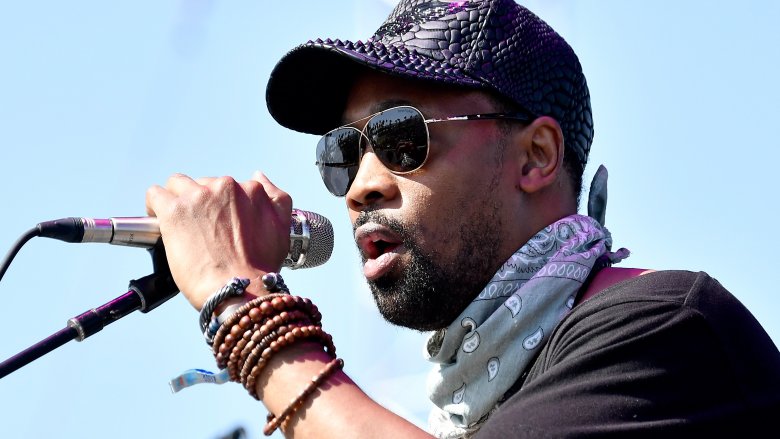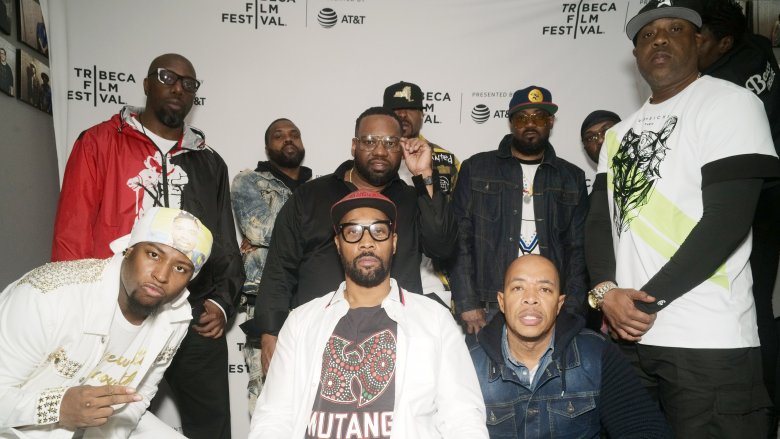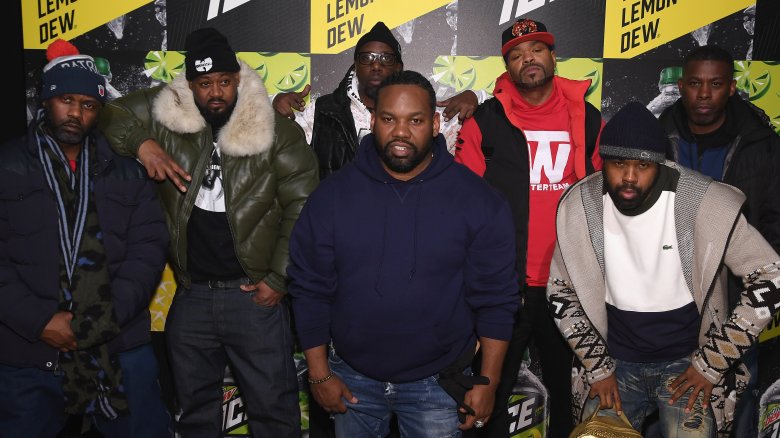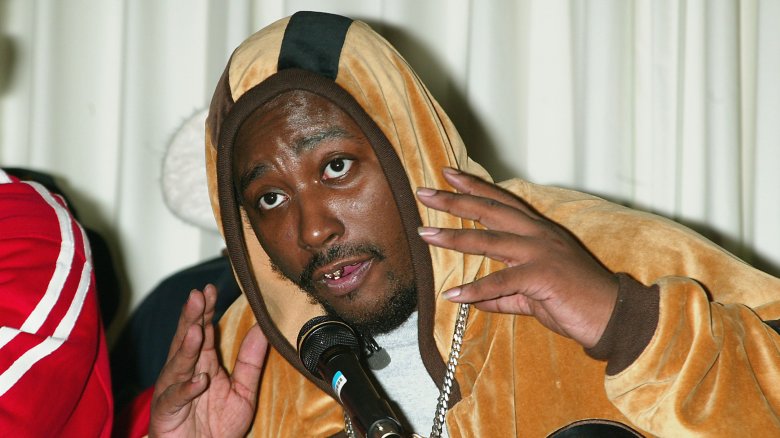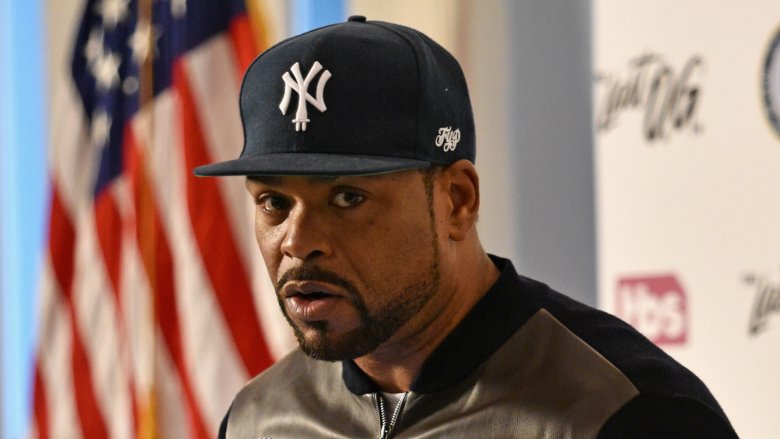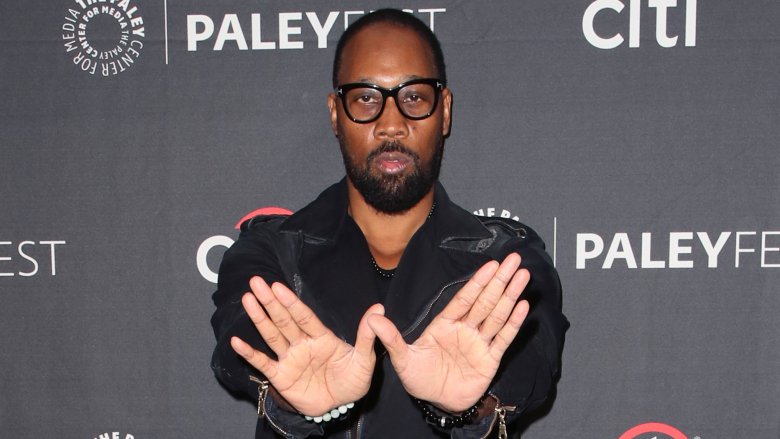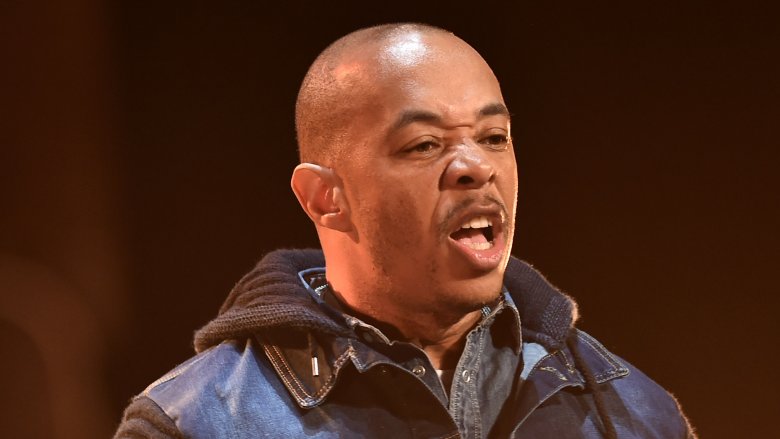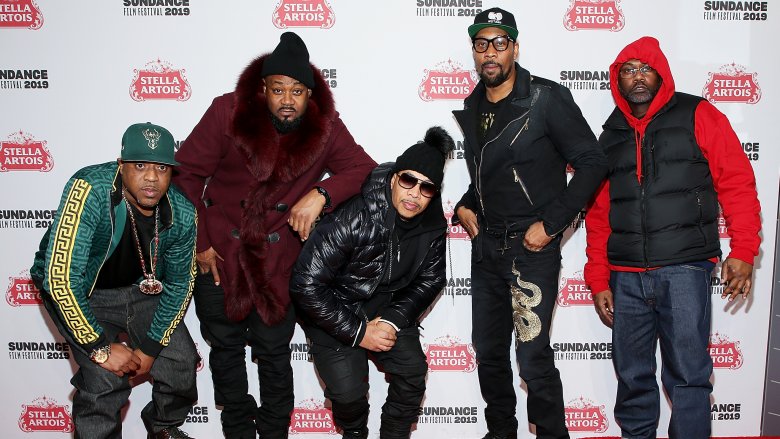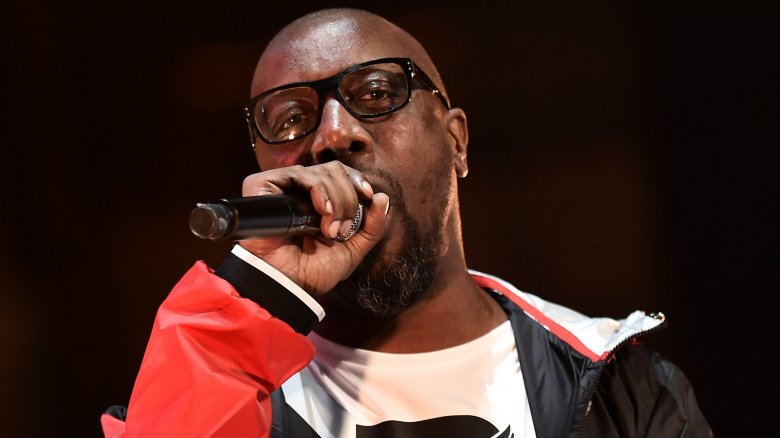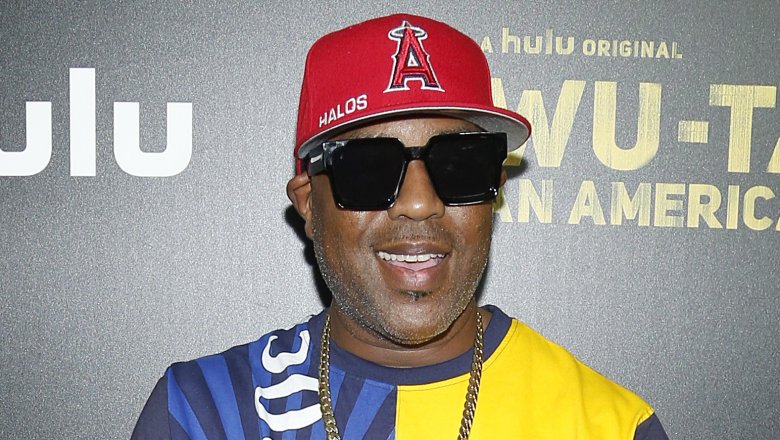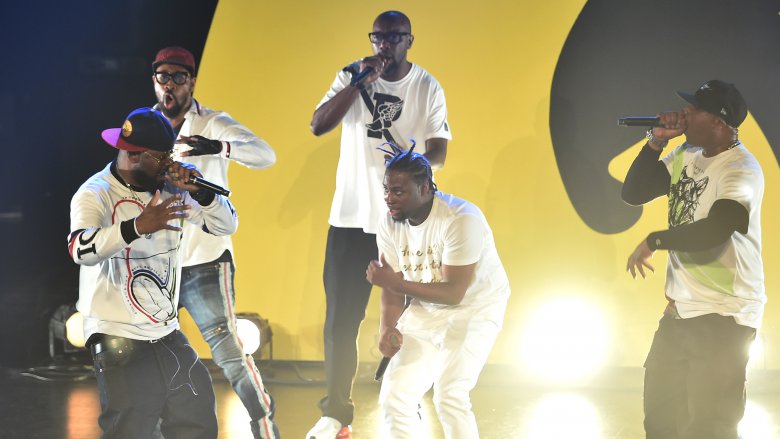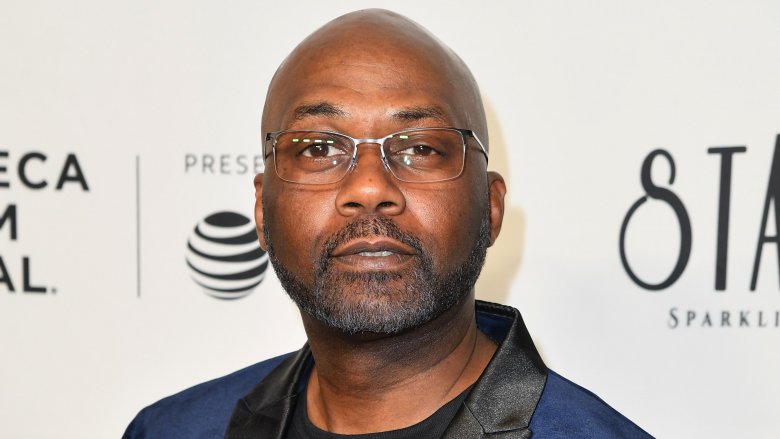The Troubled History Of The Wu-Tang Clan
RZA. GZA. Method Man. Ghostface Killah. ODB. Raekwon. Inspectah Deck. U-God. Masta Killa. Some instinctively rise up from their chair to salute those names, while others give them a long look and wonder whether they're YouTube celebrities or new types of Pokemon. Still, even the most casual music fan should recognize the name of the collective unit these nine men were the original members of: the Wu-Tang Clan.
Easily one of the (if not the) most recognizable and famous groups of the 1990s rap scene, the Wu-Tang Clan has influenced the hip hop scene like few others. The clan and its affiliates have released over a hundred albums, its members have been involved in countless projects, and as Stereogum notes, they even have their own TV series called An American Saga and a four-part documentary, Of Mics and Men. That's success, that is.
However, it hasn't always been smooth sailing for the collective. From their humble beginnings at Staten Island to the many (often self-imposed) hurdles they've had to climb since then, the story of the group is riddled with difficulties. Let's take a look at the troubled history of the Wu-Tang Clan.
The Wu-Tang Clan's endless internal squabbles
If you ever find yourself wondering where the beef is, chances are it's between two or more members of the Wu-Tang Clan. As Vulture tells us, the group had internal tensions from the very beginning, but they originally managed to channel this into their creative work. The group's mastermind and producer, RZA, even deliberately pitted Wu-Tang members against each other in order to win "the right to appear" on the songs.
While RZA managed to act as a mediator between bandmates until 1997, their fall tour with Rage Against the Machine that year finally seemed to crack the thin veneer of unity, and the group had to pull out of the tour because of interpersonal tensions (and a bunch of Wu-Tang members just plain not showing up to the shows). After that, their many internal battles have been rather well-publicized, as the Wu-Tang members haven't been shy to speak about their various beefs with each other. Interestingly, a good chunk of the animosity seems to have turned against RZA himself, who's been sued by at least two of his group members and has been in the receiving end of numerous public digs from Raekwon and U-God in particular.
The FBI used to suspect the Wu-Tang Clan of all sorts of major crimes
Every self-respecting famous artist has an enemy or two, but leave it to the Wu-Tang Clan to have beef with none other than the FBI. As Vice tells us, said beef was largely a one-sided thing nursed by the Bureau. From 1999 to 2004, the FBI (along with the NYPD) investigated the Wu-Tang Clan about a whole host of alleged crimes, ranging from gang ties to drug crimes and money laundering.
One particular object of their interest was Russell Jones, aka Ol' Dirty Bastard, who incidentally died the same year the investigations died down. However, the feds were also completely fine with labeling the entire group with the tag "281F," which means the FBI at one point considered the Wu-Tang Clan a "major criminal organization." As Billboard notes, even murder charges were on the table for a while, as the investigators suspected that RZA and Raekwon had ordered hits on two men who robbed their family members.
The unexpected death of ODB
As you can probably guess by his street name, Ol' Dirty Bastard was a controversial character. As Vulture tells us, he was something of the wild man of the Wu-Tang Clan, with his solo career dealings and failure to show up to concerts drawing ire from bandmates. However, his chapter in the Wu-Tang legacy would ultimately be a tragic one, as in 2004, ODB unexpectedly died at a recording studio.
According to Rolling Stone, the controversial rapper died of a heart attack brought on by a cocktail of the painkiller Tramadol and cocaine, shortly before he would have turned 36. Birthdays aside, this happened at a particularly unfortunate point of ODB's career. He'd recently been released from prison, a reality show based on his life was set to premiere soon, and he was putting together his latest solo album, Osirus. What's more, he ended up leaving this mortal coil in less than exemplary terms with his Wu-Tang brothers. Just one day before his death, Method Man had called him out onstage for no-showing to a Wu-Tang Clan gig.
Method Man was almost a victim of a drive-by shooting
The Wu-Tang Clan is a massive collective, but would it still exist if one of its key members had died before they made it big? Possibly not, said Wu-Tang mastermind RZA in a 2009 interview with the CNN (via XXL). In fact, he said that they almost got to test this theory, seeing as founding member Method Man almost perished in a drive-by shooting incident when they were so young that they weren't Wu-Tang quite yet.
According to RZA, Method Man had been on his way to buy some marijuana at the Staten Island house that would later feature on the group's "Protect Ya Neck" music video when RZA spotted his friend and called him over. Mere moments after Method Man had jogged to RZA's side of the street, someone started shooting at the house he'd just been standing in front of. Method Man had narrowly avoided the hail of bullets, but one of their friends died in the shootout.
RZA almost went to jail for shooting a guy in the leg
One of the first times a Wu-Tang Clan member (well, a future member at that point) had a run-in with the law was also nearly the most influential one. As Oxygen tells us, the group's leading figure, RZA, was arrested in 1991 for allegedly shooting a man named Willie Walters in the leg. This was a major problem for his future prospects, because as the man himself put it, "Black dudes don't really go to trial and win."
According to RZA's interview with CNN (via XXL), he would've had to serve eight years if found guilty, which might very well have been disastrous for the Wu-Tang Clan. Fortunately for him, the jury ultimately believed that his actions were self-defense, and he was acquitted in 1992. Even more fortunately, he gained some serious insight from the incident that would serve him well over his career. RZA says that the time spent alone in the jail cell contemplating his choices, along with his promise to his mother to stay on the "straight and narrow path" in the future, gave him focus and enabled him to "get serious" in his new stomping grounds in New York's Staten Island.
U-God's parole trouble and personal tragedy
Most musical groups have that one member whose name no one can recall or who everyone just likes less than the others. According to The New Yorker, U-God is Wu-Tang Clan's take on that guy, as he's "the least loved member" of the group. However, it must be noted that U-God has a story behind his relatively insignificant Wu-Tang role.
U-God was part of the inner circle of friends and family that would eventually morph into Wu-Tang Clan, but he was also a drug dealer who ended up behind bars after a "careless confrontation" with a rival in 1992. This happened to coincide with the rest of the group working on the first Wu-Tang album, Enter the Wu-Tang (36 Chambers). When U-God got out, his rapping style was comparatively simple and unrefined, and his role in the group's rise remained fairly small due to both this and his repeated parole violations whisking him back behind bars at key moments.
Despite all this, he kept churning away in the background, solving conflicts between other Wu-Tang members and doing grunt work no one else wanted to do. Oh, and for a time, he was doing all this while coping with an incident where an acquaintance used his two-year-old son as a human shield during a shootout. The child survived but suffered permanent damage. The rest of the group, save for his friend Method Man, reportedly didn't even bother to support U-God in his time of crisis.
Wu-Tang Clan and the strange Divorce Court allegations
In 2015, Consequence of Sound reported that a strange thing had transpired in an episode of the show Divorce Court. A man started a Wu-Tang-themed, viral ramble by claiming that his spouse had slept with the Wu-Tang Clan. Yes, the entire Wu-Tang Clan.
In the interest of accurate reporting, The Daily Beast noted that the woman said she'd indeed met the Wu-Tang Clan after a show, and ended up in their hotel room where they partied — or, as she put it, "talked about politics" — until morning. However, the woman insisted that the group behaved in a very gentlemanly manner, and no unfaithful activities took place.
Meanwhile, members of the group have argued against both the supposed act ever occurring and, it seems, their alleged status as gentlemen. Method Man dismissed the whole situation as "fake" and called the lady an "old-er thot" who was way too elderly to move in their groupie circles. RZA later agreed, saying, "When I saw her, I was like, I ain't been there."
Inspectah Deck, teenage prisoner
Multiple members of the Wu-Tang Clan have spent some time behind bars, but few of them describe the effects of prison more eloquently than Inspectah Deck. According to an interview with Hip Hop DX, Deck was first "locked up" at the tender age of 15, and he describes pretty vividly how he felt the incident destroyed his dreams and forced him to build a hard shell. Incarcerated at an early age with no people from his neighborhood to rely on and having to deal with adult prisoners — some of whom were actual killers — he realized that his only chance for survival was to rely on himself and learn from his surroundings.
The rapper describes this period as the birth of his Inspectah Deck persona, and he says that his teenage stint in jail taught him to bide his time, watch what was going on, and know when to make his moves, a skill set he says helped him survive when he was eventually released back on the streets. Not that he thinks much higher of life as a "free" underprivileged kid — he even compares the kind of poverty and lack of opportunities that he and others like him grew up with to a prison cell.
Weapons charges run in Ghostface Killah's family
Ghostface Killah is not the first (or last) musician to own a gun, but oddly, his bloodline has managed to get in legal trouble with firearms in at least two documented generations. MTV News tells us that in 1997, the rapper got in hot water with the authorities when the police stopped his car in Harlem over a traffic violation. Ghostface Killah jumped out and started getting confrontational, and when the officers noticed that he was wearing a bulletproof vest, it was "probable cause to search both you and your car" time. A handgun was discovered, and an arrest ensued.
According to SI Live, in 2015, the world discovered that the phrase "like father, like son" was very much true in the Ghostface Killah household. Ghostface's adult son, rapper and Wu-Tang affiliate Sun God, was running from detectives who were raiding his home. He then threw away a handgun and was promptly caught, arrested, and eventually sentenced to three years in prison for his troubles. Allegedly, this wasn't even the first time he ditched a gun, as authorities claimed he'd pulled a similar stunt in 2013. They also alleged Sun God was in cohorts with a gang called the Komrad Militant Bloods.
Cappadonna's homeless stint
Cappadonna's status within the Wu-Tang Clan has been under some debate, but according to a 2014 interview with Hip Hop DX, group leader RZA considers him very much an official member, and has done so since the 8 Diagrams album of 2007. However, things were quite different a few years before said album.
As MTV News tells us, the year 2003 saw Cappadonna in a very strange place. Not only was the rapper accusing the Wu-Tang Clan of unfair treatment, but he was also going through an extremely rough patch in his personal life. His relationship with his wife (who was also his manager) was falling apart, and his response to the assorted crises in his life was apparently to, uh, enter a life of voluntary homelessness.
Cappadonna took to living on the streets and even started driving an illegal $10 cab in Baltimore, while simultaneously accusing the Wu-Tang Clan of owing him money. Still, he did manage to reach full Wu-Tang Clan membership status, so whether you think this was a legitimate personal crisis or a particularly inspired negotiation tactic, things seem to have worked out in the end. Still, whatever was going on at the time, Cappadonna said that his homeless cab driver stint was not determined by financial realities. As he put it, "It was by choice. But it was more of my way of rebelling against the materialistic world."
Wu-Tang Clan's copyright trouble
Wu-Tang Clan's album Once Upon A Time in Shaolin is a noteworthy album despite the fact that virtually no on has heard it in full. As Billboard describes, the infamous pharmaceutical executive Martin Shkreli bought the sole copy of the album for a reported $2 million in 2015 and teased releasing it for two years until his eventual sentence for securities fraud, upon which court ordered him to forfeit the album (along with a ton of other assets).
While the album and its owner were having their misadventures, Artnet News tells us that Wu-Tang leader RZA was facing a Once Upon A Time in Shaolin-themed challenge of his own. After it (allegedly) transpired that the album illegally used artwork by Jason Koza, the artist slapped the Wu-Tang mastermind and a number of other parties involved in the album's sale with a copyright-infringement lawsuit.
While sources say Shkreli was able to dodge his part of the suit thanks to a clause he'd woven into the purchase agreement, the case was eventually settled to the apparent satisfaction of Koza's lawyer and with an utter lack of comment from RZA's law guy. While we can only speculate on the specifics of the settlement, we can always seek comfort from the way Koza's legal complaint text referred to the album's title: "Once upon a time a great artist named Jason Koza lived in Copiague, New York."
Masta Killa's cartoon violence
It stands to reason that famous people don't always agree with the things the media writes about them, but sometimes, their reaction is pure overkill. According to The New York Times, one of these incidents came when Wu-Tang Clan member Masta Killa learned about an article in the magazine Rap Pages. The story featured a caricature-style illustration about the group that he wasn't completely on board with, and when the writer of the piece, Cheo Coker, later came to interview him for a different story, the rapper decided to make his feelings known by unleashing a nasty tirade and straight-up punching him in the eye.
Coker tried to explain Masta Killa that he was merely the writer of the piece and had nothing to do with the illustrations. Another band member challenged the writer about the fact that they hadn't made it on the cover of the magazine, which was another thing that poor, assaulted Coker had zero authority over. In the end, Coker ended up leaving the situation without pressing charges, though he later said, "Today, the first call I'd make is to the law offices of Johnnie Cochran."
